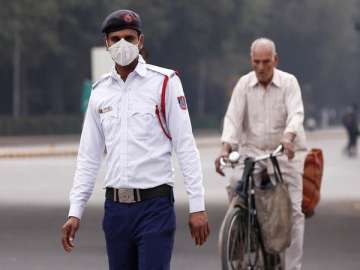A thick blanket of smog and haze engulfed Delhi and its nearby regions on Wednesday morning. The Air Quality slumped to 'very poor' category after witnessing improvement over past three days.
The overall air quality index (AQI) of Delhi was recorded at 316, according to Central Pollution Control Board (CPCB) data.
An AQI between 0 and 50 is considered 'good', 51 and 100 'satisfactory', 101 and 200 'moderate', 201 and 300 'poor', 301 and 400 'very poor', and 401 and 500 'severe'.
The CPCB said 22 areas of Delhi recorded 'very poor' air quality while 13 areas recorded 'poor' air quality.
The level of PM2.5 -- particles in the air with a diameter of less than 2.5 micrometres -- was recorded at 159 and the PM10 level was recorded at 316, it said.
In NCR, Ghaziabad, Faridabad and Noida recorded 'very poor' air quality while Gurgaon recorded 'poor' air quality, the CPCB data showed.
According to the Indian Institute of Tropical Meteorology, a haze has engulfed Delhi and the wind speed and ventilation index are "extremely unfavourable" for dispersion of pollutants.
Ventilation index determines how fast pollutants can get dispersed.
The ventilation index of around 6,000 sqm/second gets rid of pollutants, but it came down to 1,500 sqm/second on Tuesday in the city.
"The air quality is very poor and as expected, gradual increasing trend is noticed," the Centre-run System of Air Quality and Weather Forecasting (SAFAR) said.
"It is likely to remain very poor with a gradual increasing trend till Wednesday without any major episode and then likely to decline, but (will) continue to remain in very poor (category)," it said.
Meanwhile, in order to combat air pollution, the Delhi government on Tuesday released the draft of Delhi Electric Vehicle Policy of 2018 for public comments. The policy recognises that a new approach is required to kick start EV adoption in the national capital.
"About 30 per cent of particulate pollution in winter is caused by vehicles. rapid adoption of zero-emission electric vehicles is therefore of great importance to Delhi. Recognising the need for a new approach to kick-start electric vehicle adoption, we have drafted a comprehensive Delhi Electric Vehicle Policy with an aim to make Delhi a leader in adoption of electric vehicles. We believe that going electric and breathing better are two sides of the same coin," Transport Minister Kailash Gahlot said in a statement.
To tackle the increasing levels of air pollution, the Delhi government has planned to create a significant corpus of funds to incentivise every vehicle segment through the policy.
"All incentives are in addition to the incentive offered by the Government of India as part of the Scheme for Faster Adoption and Manufacturing of (Hybrid and) Electric Vehicles in India as notified on March 13, 2015 and any subsequent amendments thereof. This policy has also committed to strengthen the infrastructure for battery charging and swapping so as to provide access within 3 km range from anywhere in Delhi," a statement read.
Additional fees on non-electric vehicles will fund the bulk of corpus created to incentivise the adoption of electric vehicles. This policy will also seek to promote large-scale job creation in driving, selling, financing, servicing and charging of electric vehicles.
(With agency inputs)
Latest India News

